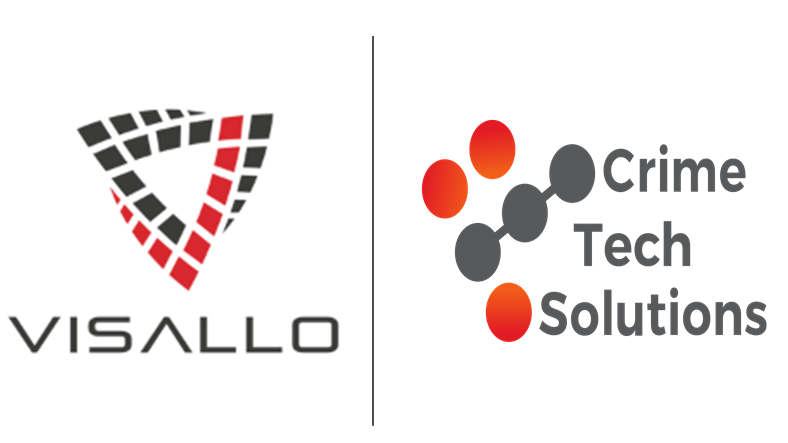A new solution for big data policing is answering the question “Can my agency afford big data policing?“. Strategic partners Visallo™ and Case Closed Software™ have built an affordable alternative to the types of solutions sold by Palantir Technologies™, IBM, and other massive tech companies.
The Visallo | Case Closed offering is the only affordable alternative for law enforcement agencies who know that the practice of crime analysis and criminal investigations management can be much worse than looking for a needle in a haystack. It’s actually pieces of needles hidden across many haystacks.
Finding those pieces and putting them together requires a metal detector and soldering gun. Visallo is the metal detector. Case Closed Software is the soldering iron.
Download our Pieces of Needles and Many Haystacks synopsis now, and contact us through the form below for more information:
[contact-form][contact-field label=”Name” type=”name” required=”1″ /][contact-field label=”Email” type=”email” required=”1″ /][contact-field label=”Website” type=”url” /][contact-field label=”Comment” type=”textarea” required=”1″ /][/contact-form]
Category Archives: Big data
Must Read: The Rise of Big Data Policing
 Here’s an excellent, must-read article from Andrew Guthrie Ferguson, a Professor of Law at the UDC David A. Clarke School of Law and author of the book The Rise of Big Data Policing: Surveillance, Race, and the Future of Law Enforcement (NYU Press 2017).
Here’s an excellent, must-read article from Andrew Guthrie Ferguson, a Professor of Law at the UDC David A. Clarke School of Law and author of the book The Rise of Big Data Policing: Surveillance, Race, and the Future of Law Enforcement (NYU Press 2017).
“The big data policing revolution has arrived. The singular insight of this innovation is that data-driven predictive technologies can identify and forecast risk for the future. Risk identification is also the goal of this book — to forecast the potential problems of big data policing as it reshapes law enforcement.”
Read the full article HERE.
In the meantime,  Case Closed Software™ reminds you that, as the only true alternative to Palantir®, we specialize in big data investigation analytics combined with the industry’s most robust investigative case management solution.
Case Closed Software™ reminds you that, as the only true alternative to Palantir®, we specialize in big data investigation analytics combined with the industry’s most robust investigative case management solution.
We are “Palantir® without the price tag and data-lock”.
Contact us for more information below:
[contact-form][contact-field label=”Name” type=”name” required=”1″ /][contact-field label=”Email” type=”email” required=”1″ /][contact-field label=”Website” type=”url” /][contact-field label=”Comment” type=”textarea” required=”1″ /][/contact-form]
Big Data Surveillance: The Case of Policing
Posted by Douglas Wood, CEO of Case Closed Software – a leader in investigation software and analytics for law enforcement.
Headquartered here in Central Texas, I recently had an opportunity to have coffee with Dr. Sarah Brayne, Assistant Professor, Department of Sociology at The University of Texas at Austin. Ms. Brayne had just published an interesting article in The American Sociological Review. The article is titled Big Data Surveillance: The Case of Policing.
The article examines the intersection of two emerging developments: the increase in surveillance and the massive exploration of “big data.” Drawing on observations and interviews conducted within the Los Angeles Police Department, Sarah offers an empirical account of how the adoption of big data analytics does—and does not—transform police surveillance practices.
She argues that the adoption of big data analytics facilitates may amplify previous surveillance practices, and outlines the following findings:
- Discretionary assessments of risk are supplemented and quantified using risk scores.
- Data tends to be used for predictive, rather than reactive or explanatory, purposes. (Here, Crime Tech Weekly would want to differentiate between predictive analytics and investigation analytics)
- The proliferation of automatic alert systems makes it possible to systematically surveil an unprecedentedly large number of people.
- The threshold for inclusion in law enforcement databases (gang databases, criminal intelligence data, etc) is lower, now including individuals who have not had direct police contact. (Here again, Crime Tech Weekly would point out that adherence to criminal intelligence best practices vastly reduces this likelihood)
- Previously separate data systems are merged, facilitating the spread of surveillance into a wide range of institutions.
Based on these findings, Sarah develops a theoretical model of big data surveillance that can be applied to institutional domains beyond the criminal justice system. Finally, she highlights the social consequences of big data surveillance for law and social inequality.
The full PDF report can be downloaded via Sage Publishing by clicking here. Or, if you have general comments or questions and do not wish to download the full version, please feel free to contact us through the form below. Crime Tech Weekly will be happy to weigh in.
[contact-form][contact-field label=”Name” type=”name” required=”1″ /][contact-field label=”Email” type=”email” required=”1″ /][contact-field label=”Website” type=”url” /][contact-field label=”Comment” type=”textarea” required=”1″ /][/contact-form]
Data Analytics Transforms Policing
 Great article from our friends at Visallo!
Great article from our friends at Visallo!
As police find new methods of tracking and solving crime, their needs and priorities in a data analytics strategy are bound to continuously evolve.
Be sure to read the article at the popular Visallo Blog, and for more information on how Visallo and Crime Tech Solutions are changing the investigation analytics world, contact us with the form below.
[contact-form][contact-field label=”Name” type=”name” required=”1″ /][contact-field label=”Email” type=”email” required=”1″ /][contact-field label=”Website” type=”url” /][contact-field label=”Comment” type=”textarea” required=”1″ /][/contact-form]
Visallo and Crime Tech Solutions: Partners in Crime-Fighting Software
Sterling, VA (August 24, 2017) – Visallo, the Sterling, VA based provider of investigation analytics software, and only true competitor to Silicon Valley giant Palantir, today announced a strategic partnership with Crime Tech Solutions out of Leander, TX.
 According to Jeff Kunkle, President of Visallo, the partnership enhances his company’s suite of easy-to-use, web-based data visualization tools for investigative link analysis, data discovery, crime analytics and geospatial analysis with Crime Tech Solutions’ powerful and flexible Case Closed investigation case management software.
According to Jeff Kunkle, President of Visallo, the partnership enhances his company’s suite of easy-to-use, web-based data visualization tools for investigative link analysis, data discovery, crime analytics and geospatial analysis with Crime Tech Solutions’ powerful and flexible Case Closed investigation case management software.
“Visallo is designed for intelligence analysts, law enforcement investigators, and fraud analysts who need easy to use tools to help them discover and visualize complex relationships within vast amounts of data without resorting to time-consuming, ad-hoc, and error-prone manual processes,” said Mr. Kunkle. “These are analysts that want to make sure they don’t miss important non-obvious insights during their investigations, want to produce more accurate, thorough, and defensible conclusions, and ultimately seek to be more accomplished investigators able to tackle the toughest cases.”
Tyler Wood, VP of Operations at Crime Tech Solutions added, “Where Visallo does much of the big data analytics, the Case Closed software is specifically designed for investigative process and major case management. The software manages the entire investigation workflow from start to finish and includes functionality such as task management, alerting, communications, evidence management, and a great deal more.”
Until now, investigative agencies had to turn to multi-million dollar solutions from behemoth multinational companies for this combined functionality. The partnership is designed to give customers more investigation functionality at a price point that can scale down to smaller groups. “For years, only the largest law enforcement and federal agencies could afford to purchase these types of advanced tools,” added Mr. Kunkle. “The partnership between Visallo and Crime Tech Solutions changes that reality.”
The companies have indicated that integration efforts are already underway to ensure a seamless and user-friendly experience.
About Visallo
Visallo helps investigators of all types produce more accurate, thorough, and timely analysis with a software platform to help them discover, visualize, and understand complex relationships hidden in massive amounts of data. Visallo’s all-in-one suite of easy-to-use, web-based, visualization tools and machine learning data analysis algorithms augment the investigator’s hard-earned experience and intuition with data-driven insights that would be difficult, if not impossible, to discover otherwise.
About Crime Tech Solutions
Crime Tech Solutions develops and markets a robust suite of powerful software solutions designed for intelligence and investigation teams. Their flagship products include the popular Case Closed™ investigation platform and IntelNexus™, an advanced criminal intelligence management software.
Big Data Investigation Analytics: A Difference Maker for Law Enforcement
How Investigative Agencies do More with Less!
The investigative units of law enforcement agencies all around the world face many of the same challenges. Chief among those challenges is the fact that budgets are tightening, while resources are becoming more and more scarce. Even in the face of reduced funding, investigators are asked to deliver higher levels of service in their quest to solve and deter crime.
The key to doing ‘more’ with ‘less’ in law enforcement is really no different than in any other industry. That is, deploying resources in the most effective manner possible for the maximum value possible. The trick is using what the agency already knows to determine what the future may hold. What that all boils down to is Big Data Investigation Analytics.
Data in Law Enforcement comes in many forms, and is typically stored in disparate silos. Arrest records, calls for service, criminal intelligence, field reports, human resource data, telephone records, case management files, and so on. Together, the data from those systems can represent a virtual goldmine of investigative information if used correctly.
 ‘Correctly’ is the operative term, of course. The ability to turn these large data stores into actionable investigation intelligence requires more than a simple data warehouse or data mining tool, and for the most part police departments recognize this need. They understand that their data holds the key to understanding the hidden connections between people, places, and things – the lynchpin of any successful investigation.
‘Correctly’ is the operative term, of course. The ability to turn these large data stores into actionable investigation intelligence requires more than a simple data warehouse or data mining tool, and for the most part police departments recognize this need. They understand that their data holds the key to understanding the hidden connections between people, places, and things – the lynchpin of any successful investigation.
For years, law enforcement agencies and commercial organizations have built data mining tools and data warehouses. Unfortunately, these analytical techniques are no longer sufficient in an age of rapidly growing data. Moreover, much of the data that investigators need to access is unstructured text – word processing documents, narratives, search warrants, witness statements, email text, and more. By applying big data text analytics, investigators can begin to extract actionable insights from both structured and unstructured data.
 Big Data Investigation Analytics – such as those provided by Virginia based Visallo and California’s Palantir Technologies – are two examples that provide a powerful indexing architecture allowing investigators to find non-textual data, including multimedia files such as 911 calls, interrogation videos, and images. This architecture helps investigators find things that they simply could not find otherwise.
Big Data Investigation Analytics – such as those provided by Virginia based Visallo and California’s Palantir Technologies – are two examples that provide a powerful indexing architecture allowing investigators to find non-textual data, including multimedia files such as 911 calls, interrogation videos, and images. This architecture helps investigators find things that they simply could not find otherwise.
Finally, world-class investigation analytics provide a flexible graph visualization tool, as well. This user interface allows investigators to organize data through a variety of layout options, find hidden and non-obvious relationships between entities, and perform a variety of what-if scenarios.
 When paired with the robust investigative case management and criminal intelligence systems available from Crime Tech Solutions, big data investigation analytics build a foundation upon which investigators can solve more crimes, more quickly.
When paired with the robust investigative case management and criminal intelligence systems available from Crime Tech Solutions, big data investigation analytics build a foundation upon which investigators can solve more crimes, more quickly.
Without advanced investigation analytics, agencies often find themselves looking for a needle in a haystack. In fact, too often the needle is broken into several pieces spread across multiple haystacks. To simplify these tasks, investigative agencies must deploy the correct analytical technologies which have become a key element of doing more with less in the global investigation market. For more information on how Crime Tech Solutions and Visallo are changing the law enforcement analytics landscape, please contact us below!
[contact-form][contact-field label=”Name” type=”name” required=”1″ /][contact-field label=”Email” type=”email” required=”1″ /][contact-field label=”Website” type=”url” /][contact-field label=”Comment” type=”textarea” required=”1″ /][/contact-form]
China building big data platform for pre-crime
Re-posted by Crime Tech Solutions – Your Source for Investigation Software
It’s “precrime” meets “thoughtcrime.” China is using its substantial surveillance apparatus as the basis for a “unified information environment” that will allow authorities to profile individual citizens based upon their online behaviors, financial transactions, where they go, and who they see. The authorities are watching for deviations from the norm that might indicate someone is involved in suspicious activity. And they’re doing it with a hand from technology pioneered in the US.
 As Defense One’s Patrick Tucker reports, the Chinese government is leveraging “predictive policing” capabilities that have been used by US law enforcement, and it has funded research into machine learning and other artificial intelligence technologies to identify human faces in surveillance video. The Chinese government has also used this technology to create a “Situation-Aware Public Security Evaluation (SAPE) platform” that predicts “security events” based on surveillance data, which includes anything from actual terrorist attacks to large gatherings of people.
As Defense One’s Patrick Tucker reports, the Chinese government is leveraging “predictive policing” capabilities that have been used by US law enforcement, and it has funded research into machine learning and other artificial intelligence technologies to identify human faces in surveillance video. The Chinese government has also used this technology to create a “Situation-Aware Public Security Evaluation (SAPE) platform” that predicts “security events” based on surveillance data, which includes anything from actual terrorist attacks to large gatherings of people.
The Chinese government has plenty of data to feed into such systems. China invested heavily in building its surveillance capabilities in major cities over the past five years, with spending on “domestic security and stability” surpassing China’s defense budget—and turning the country into the biggest market for security technology. And in December, China’s government gained a new tool in surveillance: anti-terrorism laws giving the government even more surveillance powers and requiring any technology companies doing business in China to provide assistance in that surveillance.
The law states that companies “shall provide technical interfaces, decryption and other technical support and assistance to public security and state security agencies when they are following the law to avert and investigate terrorist activities”—in other words, the sort of “golden key” that FBI Director James Comey has lobbied for in the US. For obvious reasons, the Chinese government is particularly interested in the outcome of the current legal confrontation between the FBI and Apple over the iPhone used by Syed Farook.
Bloomberg reports that China is harnessing all that data in an effort to perform behavioral prediction at an individual level—tasking the state-owned defense contractor China Electronics Technology Group to develop software that can sift through the online activities, financial transactions, work data, and other behavioral data of citizens to predict which will perform “terrorist” acts. The system could watch for unexpected transfers of money, calls overseas by individuals with no relatives outside the country, and other trigger events that might indicate they were plotting an illegal action. China’s definition of “terrorism” is more expansive than that of many countries.
At a news conference in December, China Electronics Technology Group Chief Engineer Wu Manqing told reporters, “We don’t call it a big data platform, but a united information environment… It’s very crucial to examine the cause after an act of terror, but what is more important is to predict the upcoming activities.”
__
(NOTE: Crime Tech Solutions is an Austin, TX based provider of crime and fraud analytics software for commercial and law enforcement groups. We proudly support the Association of Certified Fraud Examiners (ACFE), International Association of Chiefs of Police (IACP), Association of Law Enforcement Intelligence Units (LEIU) and International Association of Crime Analysts (IACA). Our offerings include sophisticated link analysis software, comprehensive crime analytics with mapping and predictive policing, and criminal intelligence database management systems.)
Is the Most Dangerous Company in America?
Posted by Tyler Wood, Operations Manager at Crime Tech Solutions
 This is a very interesting read about the current big data analytics darling, Palantir Technologies. The article from GS Early appears on the Personal Liberty website HERE.
This is a very interesting read about the current big data analytics darling, Palantir Technologies. The article from GS Early appears on the Personal Liberty website HERE.
The original article follows…
“I was reading my newsfeeds and I came across a very interesting story about this highly secretive company that is apparently buying up as much Palo Alto, California real estate as it can get its hands on.
But that isn’t even the most interesting thing about them. What piques my interest is how this start-up that just added another $450 million to its funding — it now has about $20 billion in funding — got its money.
The company is called Palantir Technologies. If the name sounds familiar, it’s because it comes from JRR Tolkein’s trilogy of fantasy novels. In The Fellowship of the Ring, Saruman the wizard uses the Palantir of Orthanc, an indestructible sphere of dark crystal, to see into the future and communicate across the world.
That sounds geeky and innocuous enough, no?
But Palantir the company’s biggest clients are the FBI, SEC and the CIA. It is a Big Data company that also has corporate clients, but much of the work — from what anyone can tell — comes from hush-hush projects for the U.S. intelligence community.
This crystal ball of a company sounds less like a quaint fantasy than a key element of the “thought police” in Philip K. Dick’s dark science fiction tale “The Minority Report.”
In “The Minority Report,” the police used computers to predict when and where a crime would occur and apprehend the perpetrator before he actually committed the crime.
The crazy thing is, we’re now living in a world where Big Data makes that possible.
First, let me explain what Big Data is. Basically, now that our lives are completely recorded in various media — traffic cameras, debit card transactions, loyalty cards, phone calls, television shows watched, internet, social media, SMS texts, etc. — computers are powerful enough now to sort through all this data from all these sources and come up with predictive patterns for individuals and groups.
This is a very hot area for retail stores. But it also has enormous implications in a variety of industries; and many of them are helpful.
It is certainly a tool that law enforcement and our intelligence services would find valuable to root out potential terrorists or groups that are planning some terrorist act. It is also useful to find people who are attempting to elude authorities. And being able to get ahead of the some of the more devious players on Wall Street and their illegal trading schemes would be nice.
But you can see where this could be turned on Americans, just as easily as the NSA turned its endeavors on to less than righteous paths.
Palantir is raising eyebrows in the epicenter of digital startups because most companies, once they reach a certain size, move out of Palo Alto and build a campus in some surrounding town.
Not Palantir. It now owns about 10-15 percent of all the available space in Palo Alto, more than 250,000 square feet. It is the fourth most valuable venture backed company in the world.
The irony in the article was, the concern wasn’t about its biggest client or what it’s doing for the CIA, it was the fact that it’s eating up all the available commercial space in Palo Alto and not leaving room for new startups.
My concern is a bit deeper. The CIA could have quietly gone to one of the major Big Data firms like Accenture or IBM and worked with them on whatever it is they needed. But instead they essentially built their own company, where there are much fewer people to throw up roadblocks to the work being done. I have no problem with government using Big Data to protect us; my concern is when intelligence and enforcement agencies have unfettered use of it.
But, there’s no turning back the clock. We are in the Big Data, cybersecurity age and plenty of these companies already exist. Usually their goal is help their clients sell more lavender soap in February or figure out what kind of salad greens a 37-year-old mother of two prefers to buy at 7 p.m. on a Wednesday evening.
On a fundamental level, it’s best to keep your digital footprint light. Make sure you have secure passwords that aren’t just 1234 or your pet’s name. Most browsers have an “incognito” mode that won’t track your browser history. But truth be told, if someone really wants your history, they can get it.
If you’re more serious about hiding your footprints, look into encrypted services like Tor (www.torproject.com) that will protect against traffic analysis (browser history, instant messaging, etc.). It’s free and very good.
Transactions in bitcoins is a way to keep your footprint light in the marketplace.
And if you’re looking to make money on the trend, there are any number of companies that are at the forefront of cybersecurity (Palo Alto Networks, FireEye, Synamtec) and Big Data (Accenture, IBM, Teradata, Oracle).
–GS Early“
(NOTE: Crime Tech Solutions is an Austin, TX based provider of crime and fraud analytics software for commercial and law enforcement groups. We proudly support the Association of Certified Fraud Examiners (ACFE), International Association of Chiefs of Police (IACP), Association of Law Enforcement Intelligence Units (LEIU) and International Association of Crime Analysts (IACA). Our offerings include sophisticated link analysis software, comprehensive crime mapping and predictive policing, and criminal intelligence database management systems.)
Link Analysis and Crime – An examination.
Posted by Tyler Wood, Operations Manager at Crime Tech Solutions
 The topic of fraud is widely discussed, and the focus of thousands upon thousands of articles. Television shows such as Crime, Inc and American Greed have become popular due, in part, to our fascination with the topic of fraud.
The topic of fraud is widely discussed, and the focus of thousands upon thousands of articles. Television shows such as Crime, Inc and American Greed have become popular due, in part, to our fascination with the topic of fraud.
The organizations that are affected by fraud are also fascinated… but for entirely different reasons. Some estimates suggest that the US economy loses 11 trillion dollars each year due to one form of fraud or another. It’s little wonder, therefore, that the companies most frequently defrauded have been heavily investing in anti-fraud technologies at an increasing rate over the past decade or more.
The biggest problem with fraud, of course, is that it is always evolving in a very Darwinian fashion. Like a living, breathing entity, fraud schemes change over time in order to survive. As the targets of fraud schemes put new policies, procedures and/or systems to deter the activities, the schemes modify and find new ways to survive.

So, since the nature of criminal activity is such that they constantly change, how do investigators find a fool proof methodology to ensure they are 100% safe from them? The answer, of course, is that they can’t. They never will; at least not until we live in a world such as the one depicted in the 2002 film Minority Report, starring Tom Cruise. In that movie, criminals are arrested prior to committing a crime based upon the predictions of psychics called ‘Precogs’. Corporations and individual targets of fraud can only wish.
Nope, there are no Precogs running around locking up would-be practitioners of fraud that would protect banks, insurance companies, Medicaid and Medicare programs, victims of Ponzi schemes, victims of identity theft, and countless others. Instead, organizations rely upon skilled knowledge workers using purpose-built crime and fraud analytics technology that can detect anomalies in patterns, suspicious transactions, hotspot mapping, networks of fraudsters, and other sophisticated data analytics tools.

Crime and fraud analytics
Any discussion of analytics and investigation software must touch upon the topic of ‘big data’. No longer just a buzz word, big data literally fuels the insights gathered by organizations in every area of business. Naturally, then, organizations who have been traditionally targeted by fraudsters have increasingly invested in crime technology such as investigation software and analytics in order to exploit the phenomenon.
 Of course, big data in and by itself does nothing. It just sits there. Nobody has ever yelled “Help! We’ve been defrauded! Call the big data!” Big data is only useful when it can be transformed into ‘smart data’. In other words, understanding the big picture of costly fraudulent activities is not akin to understanding the specifics of ‘who’ is defrauding you, and ‘how’ they are doing it.
Of course, big data in and by itself does nothing. It just sits there. Nobody has ever yelled “Help! We’ve been defrauded! Call the big data!” Big data is only useful when it can be transformed into ‘smart data’. In other words, understanding the big picture of costly fraudulent activities is not akin to understanding the specifics of ‘who’ is defrauding you, and ‘how’ they are doing it.
Those questions can best be answered through the powerful data mining and link analysis software tools offered by Austin, TX based Crime Tech Solutions in partnership with Sterling, VA based Visallo. Effective link analysis complements big data analytics platforms, helping to expose previously undetected fraud, and the entities (people or organizations) committing it.
Link Analysis – Transforming big data into smart data
By definition, link analysis is a data analysis technique that examines relationships among people, places, and things. As a visual tool, link analysis provides users a powerful method to quickly understand and ‘see’ what is happening. Because of this, it is widely used by financial institutions such as banks and insurance companies to uncover criminal networks, improve fraud investigations, detect insider fraud, and expose money laundering schemes. Similarly, government agencies use link analysis to investigate fraud, enhance screening processes, uncover terrorist networks and investigate criminal activities.
At Crime Tech Solutions, we liken the question of how to detect and deter fraud to ‘How do you eat an elephant?’ The answer, of course, is one bite at a time. If big data is the elephant, comprehensive link analysis software is part of the one ‘bite’ at a time. Or should we say ‘byte’.
(NOTE: Crime Tech Solutions is an Austin, TX based provider of investigation software and analytics for commercial and law enforcement groups. We proudly support the Association of Certified Fraud Examiners (ACFE), International Association of Chiefs of Police (IACP), Association of Law Enforcement Intelligence Units (LEIU) and International Association of Crime Analysts (IACA). Our offerings include sophisticated link analysis software, an industry-leading investigation case management solution, and criminal intelligence database management systems.)


